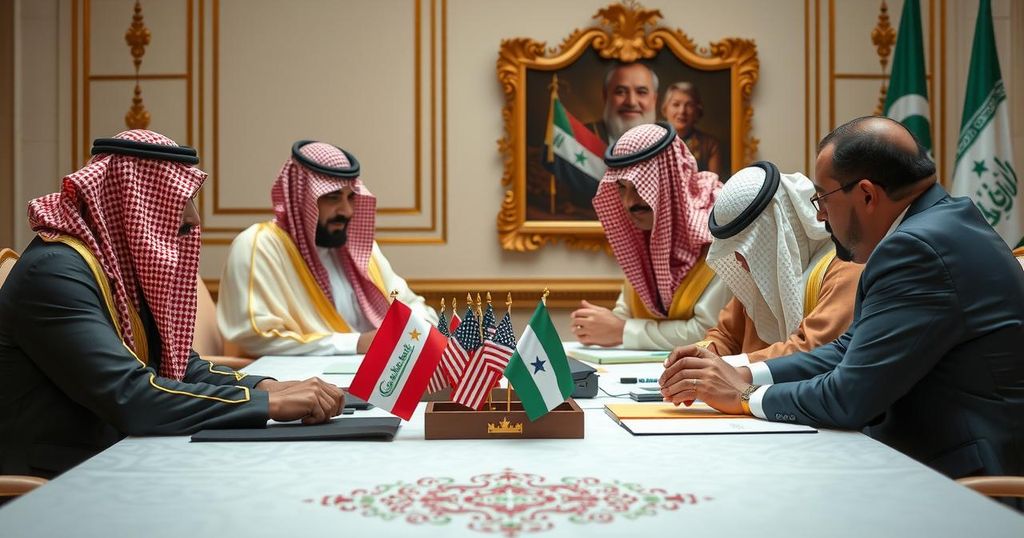Western and Arab Leaders Meet in Saudi Arabia to Discuss Syria’s Sanction Relief

Top Western and Arab diplomats convened in Riyadh to address Syria’s future after President al-Assad’s ousting, focusing on sanction relief to aid economic recovery. The meeting included discussions on humanitarian assistance and the implications of Western sanctions under the new Syrian administration led by Hayat Tahrir al-Sham. Key diplomatic figures participated, signaling a shift in international policy towards Syria post-al-Assad.
Foreign ministers and high-ranking diplomats from Western and Middle Eastern countries convened in Riyadh to deliberate on Syria’s future following the recent ousting of President Bashar al-Assad. This gathering marked a significant moment as it was the first regional meeting post-al-Assad, with discussions focused on the possibility of sanction relief. Syria’s newly appointed Foreign Minister Asaad Hassan al-Shaibani arrived in Saudi Arabia calling for an end to longstanding sanctions that have impacted the country’s economy.
The meeting included representatives from Saudi Arabia, Egypt, the UAE, Qatar, Bahrain, Iraq, Jordan, Lebanon, and Turkey, along with U.S. Under Secretary of State John Bass, German Foreign Minister Annalena Baerbock, and British Foreign Secretary David Lammy. The newly formed administration in Syria, led by Hayat Tahrir al-Sham (HTS), emphasized the need for lifting Western sanctions to facilitate international aid and funding.
Analyst Rob Geist Pinfold observed that the Biden administration appears to be aligning with HTS’ requests regarding sanctions, indicating a willingness to freeze sanctions that restrict essential services like energy supplies. This reflects a shift in Western policy towards Syria post-al-Assad, with the U.S. introducing an exemption for transactions involving governing institutions in Syria to aid humanitarian efforts.
Germany, Italy, and France are advocating for relaxed EU sanctions on Syria, although any decisive changes will require consensus within the bloc. The EU’s chief diplomat, Kaja Kallas, indicated that priority might be given to sanctions that obstruct infrastructure development and banking access, while Baerbock highlighted the necessity to retain sanctions on al-Assad’s associates implicated in severe civil war atrocities.
Following al-Assad’s ouster by a rebel offensive, HTS established a caretaker government, appointing al-Shaibani as its foreign minister. This gathering signified a critical step towards potential international recognition of Syria’s new leadership, coming on the heels of earlier discussions in Rome and a meeting hosted by Jordan addressing the complexities surrounding Syria’s governance and diplomatic relations.
The recent meeting of Western and Arab leaders in Saudi Arabia represents a fundamental turning point in Syria’s political landscape. Following the overthrow of President Bashar al-Assad, the newly established administration has sought to alleviate decades-old sanctions that have strained Syria’s economy. The participation of high-ranking diplomats from key countries underscores the geopolitical interest in Syria’s stability and future governance, highlighting the potential shifts in international policy given the changing leadership.
The assembly of Western and Arab leaders in Saudi Arabia to discuss Syria marks a crucial moment in the country’s political transition following al-Assad’s removal. With a focus on sanction relief to foster economic recovery, the meeting reflects a significant shift in diplomatic stances and presents an opportunity for Syria’s new administration to engage with the international community. As these developments unfold, the complexities of humanitarian aid, governance, and global relations will continue to shape Syria’s path forward.
Original Source: www.aljazeera.com








